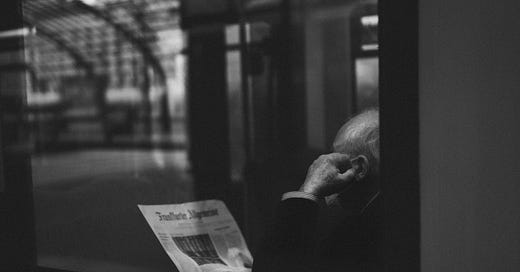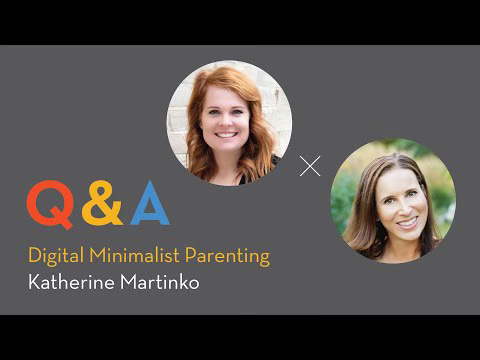For many years, I worked as a columnist and editor in environmental news. I was a proponent of taking small steps to reduce one's carbon footprint. There is cumulative power in minor acts, repeated over time and modeled for others, even if they don't feel like they're changing the world in the moment. And they have a hopeful effect on individuals, which counts for a lot.
I'm no longer working in that field, but that same philosophy applies to dealing with digital media. People tend to think that resistance is futile when it comes to curbing smartphone use (I often hear, "It's too late!"), but I disagree. We can always “start small on something big,” to quote Ryan Holiday in his book, Courage Is Calling.
There is so much we can do to fight the technological takeover of our lives. How? By engaging in small acts of rebellion. These are minor tweaks, subtle behavioural changes, or one-off decisions that separate us from our phones (and normalize it), challenge our device dependency, prove there's another way to do things, and reinforce our own sense of capability.
Recently I've compiled a list of some small acts. They range from silly to significant, as you'll see. They're a mix of things I've done or want to do, heard about, read in comments or books or articles. I'd love to hear yours, too.
1. Leave your phone at home
Basic advice, but it's a real test for many of us nowadays. Leave it behind if you go for a walk or meet a friend for coffee. Try running errands or going to the gym without it. If that feels extreme, leave it in the car or put it on airplane mode, so it's there for emergencies, but not easily accessible.
2. Don't use headphones
I rode the New York City subway for several days last week, and was amazed at how many people have AirPods or headphones. It’s nearly impossible to have a spontaneous conversation with anyone. While there's a time and place for listening to music or podcasts, it's also important to spend time alert to one's surroundings and sitting alone with one's thoughts. Practice it occasionally. The older I get, the more I realize how making big decisions in life requires active thinking time—and often that needs to be carved out consciously.
3. No Googling restaurant reviews
When travelling (which I've been doing lots of lately), it is tempting to turn to Google to decide where to eat. But arguably, it's far more rewarding to explore a city and discover interesting places to eat based on what looks good, what has curb appeal, or what's busy with other customers.
If you're uncomfortable with that, ask hotel staff or fellow travellers for recommendations. I got a fantastic restaurant recommendation from a guy on a ski lift in Mont Tremblant a few weeks ago, better than anything I would've found online.
4. Read a book in public
Carry a book with you and read it in waiting rooms, on trains, in the airport, at kids' sports practices. It is almost jarring to see someone read a physical book these days, but whenever I do, I'm filled with curiosity. I want to know what book it is and, even more so, who they are!
5. No WiFi on a plane
Several flights I've taken recently had free WiFi for all passengers, but I didn't log in. Airplanes are a rare opportunity to be disconnected and uninterrupted for hours on end. Instead, I cracked open a copy of Sarah Wynn-Wilson's explosive new memoir, Careless People, all about the inside workings of Facebook. And I read most of it over the course of several hours, something that would've taken me days at home.
6. No social media
More people are rejecting social media altogether, deleting their profiles and opting for alternative ways to communicate. To say "I don't have Instagram (or Facebook or Snapchat)" feels like a subtle power move these days, sort of like giving the finger to the Machine. For inspiration, check out Appstinence or mull over the concept of “digital modesty,” which I love.
7. No smartphone
This one is a bold act of rebellion. One reader wrote that she loves being able to say, "My phone doesn't do that," whenever anyone assumes she has a smartphone. It stops people short in their tracks because it sounds so foreign; and yet, this is how we all lived less than 15 years ago! It's a good reminder of how we have made ourselves dependent on these devices, but it really doesn't have to be that way. The next time you see a QR code on a restaurant table, ask for a paper menu.
8. Use a real camera
Recently I've seen several people pull out "old-fashioned" compact digital cameras to take pictures, instead of using smartphones. It is always a bit surprising, yet delightful at the same time. There's a sense that they are taking the picture truly for the sake of the picture, not just to post online.
In a similar vein, there are lots of little analog swaps you can make, just to be less reliant on a smartphone to do it all. An alarm clock, a calculator, a pen and paper, a physical cookbook, a paper map or calendar, a real newspaper, opting for “dumb” appliances, etc., might be less convenient in some ways, but they’re undeniably effective ways to reduce distraction, teach kids about the world, and reduce dependence on a single item.
9. Shop in-person
I avoid shopping online whenever possible. There are numerous reasons for this. Clothes fit me weirdly, so I always want to try them on first. But I also love visiting interesting shops, both in my own town and places I visit, and their existence depends on patronage; so I do feel a certain sense of responsibility to allocate my money to smaller privately owned businesses whenever possible, rather than to Amazon or other online retailer. Plus, it gets me out of the house, interacting with real people, which is always good.
10. Take phone-free trips
When we take our kids on backcountry canoe trips each summer, my husband and I turn off our phones for 4-5 days. It totally changes the vibe of the trip because there is no external distraction; all of our focus is on the present moment, shared with our kids. We've done the same for road trips in other countries, choosing not to pay exorbitant roaming costs and simply living offline except when we have WiFi access in an Airbnb at night. Dr. Anna Lembke talks about the benefits of phone-free family vacations, as well.
11. Say hello
Sometimes it seems like our whole society has convinced itself that it's antisocial, doesn't want to interact with strangers, would rather inhabit the safe, protected zone of our phones. But research shows that we are far happier after having random interactions with strangers; we thrive on small talk, even if it feels a bit stressful in the moment.
I don't need research to make me want to talk to strangers; I just love it. My kids complain that I talk to everyone, but people are remarkably quick to open up. I get information, anecdotes, advice, and come away feeling energized. The takeaway: Always say hello. You never know where the conversation will go.
12. No phones at school
If your teen has a smartphone, consider implementing a strict rule that they cannot take it to school. They have to leave it at home. It will challenge them, of course, but you’ll rest assured that they are focusing better in class—and hopefully other peers will start to do the same. You are defending their right to phone-free time and space each day, and that’s something most teens desperately need.
13. Call, Don’t Text or Email
When something needs to be communicated, resist the urge to engage in a prolonged back-and-forth text or email chain. Just pick up the phone and call someone. The conversation will inevitably be far more efficient, useful, and even pleasurable than if you’d typed it all out. It takes a bit more effort, but I’m always glad I did it.
You Might Also Like:
On Taking Responsibility: A short story by F. Scott Fitzgerald has a relevant call to action for parents
Goodbye, Instagram: Appstinence might be coming for you, too
In the News:
Listen to my chat with Aniko Hill of DopaMind in a recent podcast interview. We had a great in-depth conversation about everything from how to be an authoritative parent and set screen time rules, to promoting childhood independence and resilience, to the crucial benefits of risky play. It is available on Spotify and YouTube.
I had another very interesting chat with Roman and Bohdanna Shapoval, a.k.a. The Power Couple, for their ElectroHealth Summit. You can find a snippet of that here, as well as info on where to find the full interview.
Looking for a Speaker?
As mentioned above, I’m doing lots of public speaking now about kids and screen time. Officially, I’m a speaker on behalf of the Anxious Generation campaign, but I am also represented by the Harry Walker agency. If you’re looking for a speaker, don’t hesitate to reach out, either to the agency or to me directly.






I love this! I highly recommend leaving your phone in the car when you take your kids to the park or go grocery shopping. It is an easy small step but strangely liberating,.
(Though as someone was spent a few years carrying a Sony A-6000 way too many places, I'm never going back to that!)
Where I live we're supposed to separate our recycling and it only gets picked up once a fortnight and it is amazing how much of a damper that puts on "ordering online for me". (I don't entire understand how we're filling the recycling bin completely every two weeks without even ordering stuff online but that's another discussion.)
Just the other day I was thinking about buying a fancy pizza oven on Amazon but then thought about the cardboard boxes it would come in and what a hassle it would to be to deal with them and then started looking up where I can buy it in person instead.
Quasi-related: my 4 year discovered today that you can "say hello" to random strangers and they will basically always say hello back. (At least if you are 4 years old, results may vary if you're older.) She even said, "Daddy, why are people so nice?" We stood outside an ice cream shop for 10 minutes this afternoon because, "I want to hello more people!"
A few recent ones of mine:
- No music/podcasts when I go out to exercise. Just take in the scenery and let my mind wander.
- For online articles I want to read (like this one), I've experimented with printing them out and sending them to my e-ink reader. I've settled on printing out the long ones and sending the shorter ones to my reader to save on ink and paper.
- Gradually shifting from Gmail to a modestly priced service outside of the surveillance capitalism model, downloading my 20 years of history and then deleting it entirely from the platform.